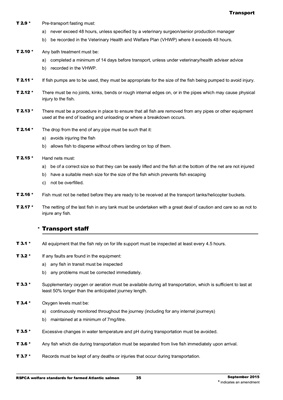
Transport
RSPCA welfare standards for farmed Atlantic salmon 35 September 2015
* indicates an amendment
T 2.9 * Pre-transport fasting must:
a) never exceed 48 hours, unless specified by a veterinary surgeon/senior production manager
b) be recorded in the Veterinary Health and Welfare Plan (VHWP) where it exceeds 48 hours.
T 2.10 * Any bath treatment must be:
a) completed a minimum of 14 days before transport, unless under veterinary/health adviser advice
b) recorded in the VHWP.
T 2.11 * If fish pumps are to be used, they must be appropriate for the size of the fish being pumped to avoid injury.
T 2.12 * There must be no joints, kinks, bends or rough internal edges on, or in the pipes which may cause physical
injury to the fish.
T 2.13 * There must be a procedure in place to ensure that all fish are removed from any pipes or other equipment
used at the end of loading and unloading or where a breakdown occurs.
T 2.14 * The drop from the end of any pipe must be such that it:
a) avoids injuring the fish
b) allows fish to disperse without others landing on top of them.
T 2.15 * Hand nets must:
a) be of a correct size so that they can be easily lifted and the fish at the bottom of the net are not injured
b) have a suitable mesh size for the size of the fish which prevents fish escaping
c) not be overfilled.
T 2.16 * Fish must not be netted before they are ready to be received at the transport tanks/helicopter buckets.
T 2.17 * The netting of the last fish in any tank must be undertaken with a great deal of caution and care so as not to
injure any fish.
* Transport staff
T 3.1 * All equipment that the fish rely on for life support must be inspected at least every 4.5 hours.
T 3.2 * If any faults are found in the equipment:
a) any fish in transit must be inspected
b) any problems must be corrected immediately.
T 3.3 * Supplementary oxygen or aeration must be available during all transportation, which is sufficient to last at
least 50% longer than the anticipated journey length.
T 3.4 * Oxygen levels must be:
a) continuously monitored throughout the journey (including for any internal journeys)
b) maintained at a minimum of 7mg/litre.
T 3.5 * Excessive changes in water temperature and pH during transportation must be avoided.
T 3.6 * Any fish which die during transportation must be separated from live fish immediately upon arrival.
T 3.7 * Records must be kept of any deaths or injuries that occur during transportation.